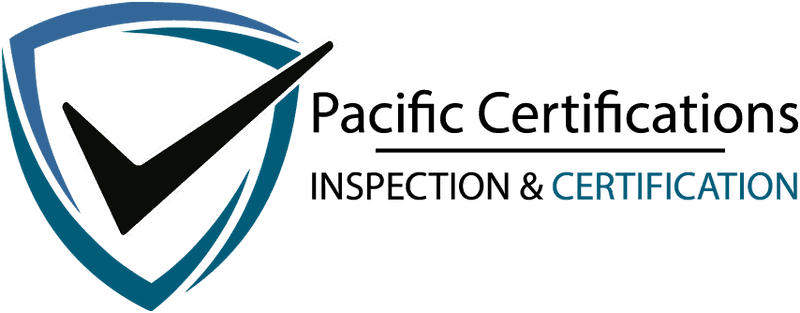ISO Certifications for Cheese Manufacturing Businesses, Requirements and Benefits
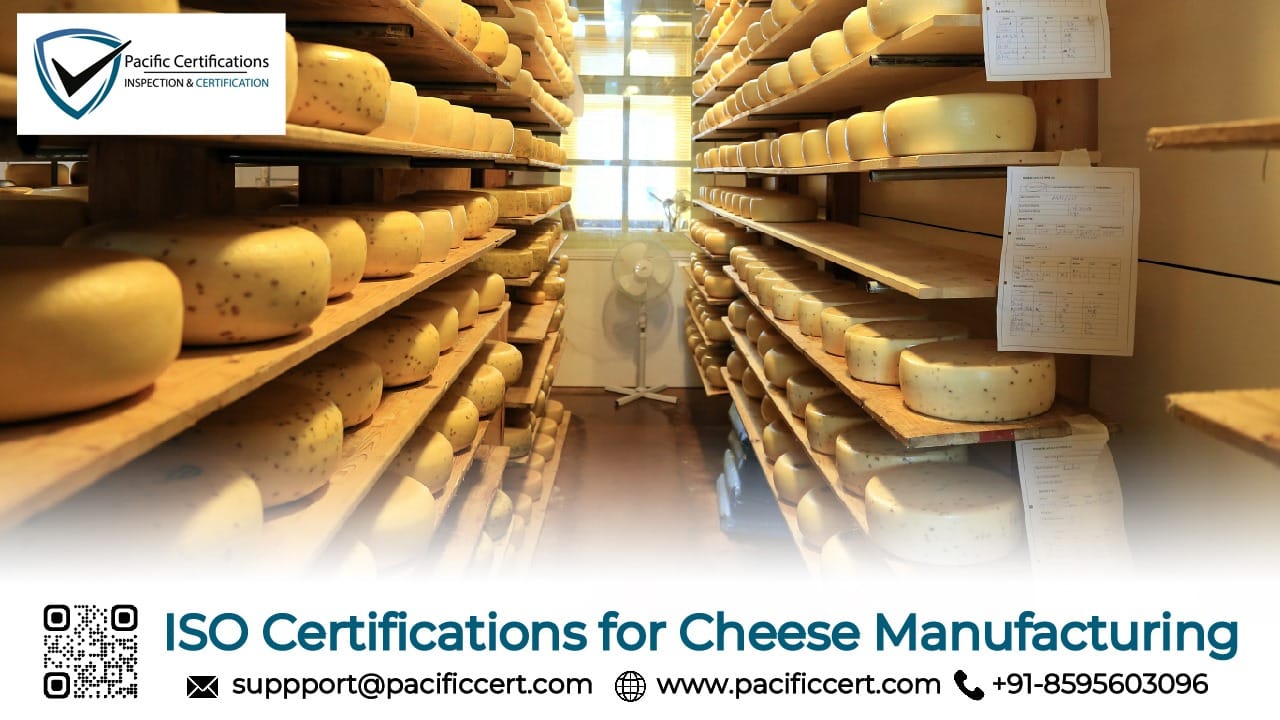
ISO Certifications for Cheese Manufacturing
The cheese manufacturing industry faces unique challenges, requiring a robust system to ensure quality, safety, and environmental responsibility. This article explores ISO certifications' critical role in achieving these goals, with a particular focus on ISO 9001, ISO 22000, and ISO 14001 standards.
These certifications not only align production processes but also boost consumer confidence, enable regulatory compliance, and open doors to international markets. Here’s an in-depth look at how ISO standards can elevate cheese manufacturing to the next level.
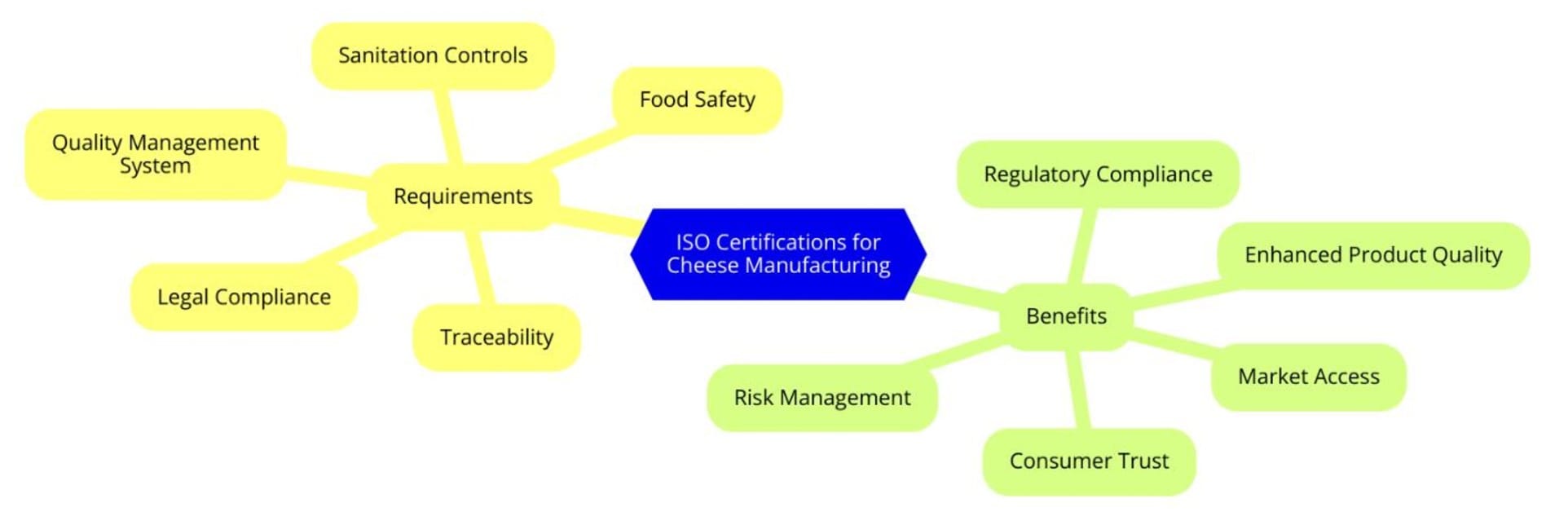
Introduction to ISO Certifications for Cheese Manufacturing
ISO certifications provide a framework for quality, food safety, and environmental standards that are crucial in cheese production. Implementing these standards can help manufacturers achieve consistent product quality, minimize risks, and adhere to international standards.
These certifications can lead to improved customer satisfaction, higher operational efficiency, and increased market reach.
Ready to enhance quality and safety in your cheese manufacturing? Contact us for ISO certification assistance at [email protected] or +91-8595603096.
Importance of ISO Standards in the Cheese Manufacturing Industry
With consumers increasingly aware of food safety, dairy products like cheese must meet strict regulatory and quality standards. ISO certifications ensure that every part of the production process, from sourcing raw materials to final product packaging, is safe, efficient, and environmentally sustainable.
They offer cheese producers a blueprint to manage operations and meet consumer demands for high-quality, safe products.
Overview of Key ISO Standards for Cheese Manufacturers
Here’s a breakdown of the essential ISO standards relevant to cheese manufacturing:
- ISO 9001 Quality Management: Ensures consistent product quality through effective management practices.
- ISO 22000 Food Safety Management: Focuses on food safety hazards, critical for dairy and cheese products.
- ISO 14001 Environmental Management: Guides companies in minimizing environmental impacts, such as waste management and energy efficiency.
Each of these standards plays a unique role in enhancing a cheese manufacturer's operational capabilities and meeting industry expectations.
At Pacific Certifications, we specialize in conducting audits and issuing ISO certifications for cheese manufacturers. Our experienced team works with cheese producers to assess their current processes and determine compliance with the relevant ISO standards. We guide companies through each step of the certification process, from initial evaluation to the final audit, ensuring a seamless and transparent experience.
To learn more about how we can help your cheese manufacturing business achieve ISO certification, contact us today at [email protected].
Why Cheese Manufacturing Requires Strict Quality and Safety Standards
The nature of cheese production demands meticulous attention to detail in quality and safety practices. Contamination risks in dairy products are high, and regulatory bodies enforce strict guidelines to ensure public health. With ISO certifications, cheese manufacturers can establish reliable systems to control potential hazards and ensure each product meets global safety standards.
Requirements of ISO Certifications for Cheese Manufacturing
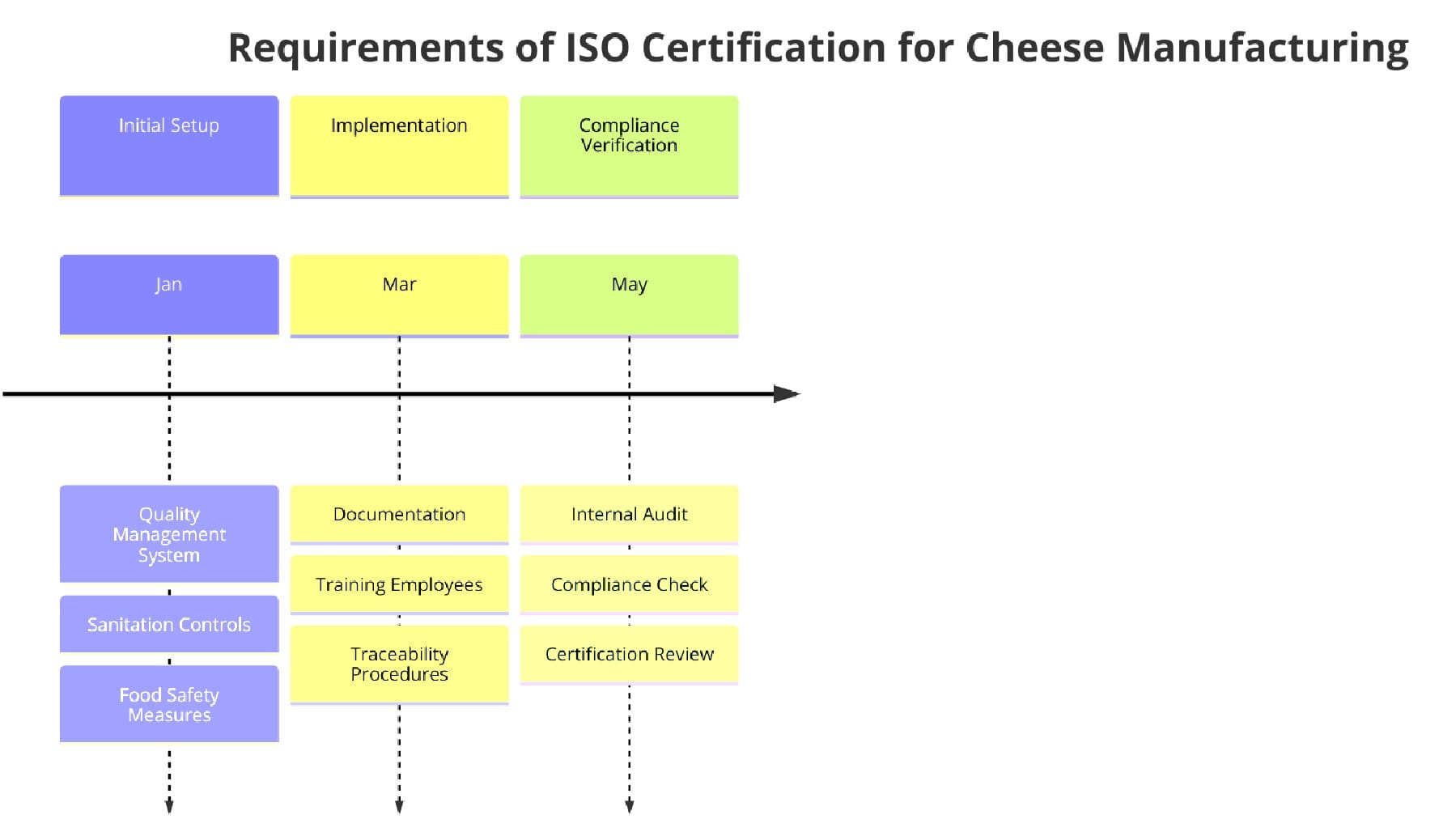
ISO 9001 is a widely recognized standard for quality management, providing a foundation for ensuring product consistency.
Key Components of ISO 9001 in the Cheese Industry
ISO 9001 requires cheese manufacturers to focus on:
- Documentation: Clear and precise documentation ensures that each step in the production process is well-regulated.
- Quality Control: Constant monitoring and adjustments prevent quality issues before they reach consumers.
- Process Standardization: Consistent procedures across all production levels ensure product uniformity.
Implementing ISO 9001 involves setting up a quality management system that addresses these components, which can improve product quality and operational control.
Requirements for ISO 22000: Ensuring Food Safety in Cheese Production
ISO 22000 addresses food safety hazards, a top priority for cheese manufacturing. The certification helps cheese producers manage and mitigate risks to ensure that every product is safe for consumption.
Understanding Food Safety Hazards in Dairy and Cheese Manufacturing
ISO 22000 guides manufacturers in identifying and managing food safety risks, including bacterial contamination and allergen control. A proactive approach to these hazards protects public health and builds consumer trust.
Hazard Analysis and Critical Control Points (HACCP) Implementation
The ISO 22000 standard integrates HACCP principles, requiring manufacturers to establish preventive measures at critical control points in the production process. This approach minimizes risks and ensures a safe final product.
Documentation and Compliance Tracking for Food Safety
Maintaining comprehensive records of production processes, safety checks, and corrective actions is essential. ISO 22000 mandates documentation to track compliance and make data-driven improvements to safety protocols.
Environmental Responsibility: Implementing ISO 14001 in Cheese Production
Environmental impact is increasingly significant in food production. ISO 14001 provides a framework for cheese manufacturers to operate sustainably and responsibly.
Reducing Environmental Impact in Cheese Manufacturing
ISO 14001 guides cheese producers in evaluating their environmental footprint and setting goals to reduce waste, conserve resources, and minimize emissions. Sustainable practices not only benefit the environment but also appeal to eco-conscious consumers.
Waste Management Practices and Sustainability
Efficient waste management is vital in cheese manufacturing. ISO 14001 requires companies to identify waste sources and implement recycling, reduction, or repurposing strategies to manage waste effectively.
Energy Conservation Initiatives in the Cheese Industry
With ISO 14001, cheese manufacturers can adopt energy-saving technologies and practices, which help reduce costs and environmental impact, aligning with industry trends towards sustainability.
Need ISO certification for your cheese production? Contact us today at [email protected] or +91-8595603096 to get started.
Steps to Obtain ISO Certifications for Cheese Manufacturing Businesses
The path to ISO certification involves several steps that help cheese manufacturers align their processes with industry standards.
- Application and Initial Assessment: Begin by applying for certification and undergoing an initial assessment to identify compliance gaps.
- Gap Analysis: Conduct a thorough review to pinpoint areas needing improvement.
- Audit Process: A formal audit evaluates compliance with ISO standards, verifying that all requirements are met before certification is granted.
These steps ensure a structured approach to achieving and maintaining ISO certifications.
Benefits of ISO Certifications for Cheese Manufacturing
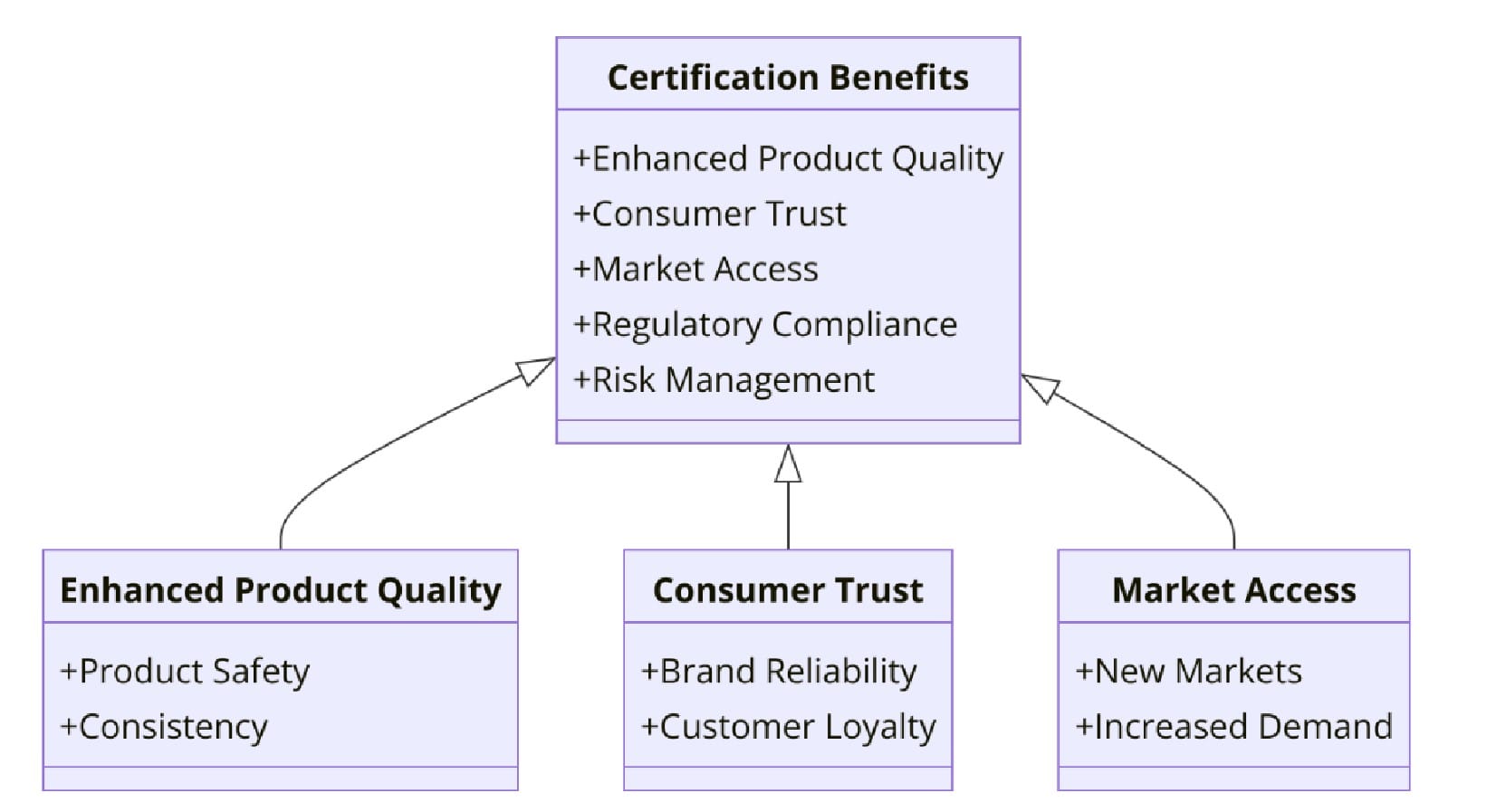
Achieving ISO certification offers numerous advantages to cheese manufacturers. Here are some of the key benefits:
Benefits of ISO Certifications for Cheese Producers
ISO certifications bring numerous advantages that can significantly impact a cheese manufacturer's success:
- Enhanced Customer Trust: Certifications signal to customers that the company prioritizes safety and quality.
- Improved Product Quality: Consistent application of quality management principles results in high-quality products.
- Regulatory Compliance: Certified companies can meet or exceed local and international regulations, easing market entry.
- Efficiency: Streamlined processes and reduced waste contribute to better resource management.
- Market Expansion: ISO certifications help businesses enter new markets by meeting global standards.
In 2024, market trends indicate an increased demand for quality-assured and sustainably produced cheese. With consumers growing more conscious of food safety and environmental impact, ISO-certified cheese manufacturers are well-positioned to lead the market. Research shows that certification in food safety and quality is a significant factor in consumer decision-making, driving demand for certified cheese products.
Additionally, new regulations across various regions emphasize the importance of traceability, sustainability, and food safety, making ISO certification even more critical for cheese manufacturers looking to maintain market relevance.
Pacific Certifications is accredited by ABIS, in case you need support with ISO certification for your Cheese Manufacturing business, please contact us at [email protected] or +91-8595603096.
FAQs: ISO Certifications for Cheese Manufacturing
What is the main benefit of ISO certification for cheese manufacturers?
ISO certification ensures that cheese manufacturers meet high standards of food safety, quality, and sustainability, leading to improved product consistency and increased consumer trust.
Which ISO standard is most important for food safety in cheese manufacturing?
ISO 22000 is the key standard for food safety in cheese manufacturing, providing a comprehensive framework for managing food safety risks throughout the production process.
Does ISO certification help cheese manufacturers with international market access?
Yes, ISO certification is widely recognized, which can help cheese manufacturers expand their market reach by meeting international standards for quality and safety.
What role does ISO 9001 play in cheese manufacturing?
ISO 9001 focuses on quality management, helping cheese manufacturers improve operational efficiency, product consistency, and customer satisfaction.
How can Pacific Certifications help with ISO certification for cheese manufacturing?
Pacific Certifications offers audit and certification services to assess and verify compliance with ISO standards, supporting cheese manufacturers in achieving certification and enhancing their operations.
Is environmental sustainability covered by ISO standards for cheese manufacturing?
Yes, ISO 14001 addresses environmental management, helping cheese manufacturers reduce their environmental impact and operate sustainably.
Read More at: Blogs by Pacific Certifications
